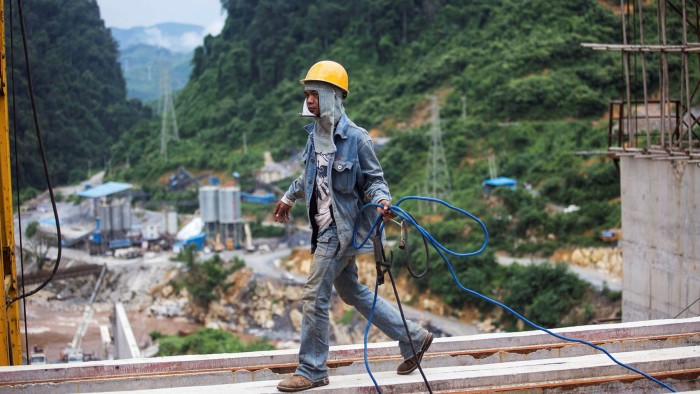Laos faces sovereign default as forex reserves dip below $1bn

Roula Khalaf, Editor of the FT, selects her favourite stories in this weekly newsletter.
Laos faces a growing risk of debt distress and sovereign default, according to credit rating agencies and economic advisers, as coronavirus and a debt-laden power sector take their toll on one of Asia’s poorest countries.
The country’s foreign exchange reserves have fallen below $1bn, less than Laos’ annual debt payments, and ministry of finance officials have asked China, the country’s biggest creditor, for advice on a possible restructuring, the Financial Times has learnt.
According to data from Refinitiv, the last Asian country to default on its sovereign debt was Myanmar in 2002.
Moody’s Investors Service last month downgraded Laos’ issuer rating a notch to Caa2 from B3, deep in “junk” territory, and changed its outlook to negative. It said that the country faced “severe liquidity stress, given the sizeable debt payments coming due this year and persisting until 2025”.
Analysts are particularly concerned about commercial financing raised by Laos in the bond market in neighbouring Thailand, which it has tapped regularly in recent years but has not returned to in 2020.
“It will be difficult for Laos to access international bond markets in this environment, and prospects for rolling over its existing obligations in the Thai bond market appear increasingly challenging,” said Jeremy Zook, director of Asia sovereign ratings with Fitch Ratings. “The government has sought commercial bank and bilateral financing to fill the gaps.”
Fitch gave Laos’ debt a B- rating and downgraded its outlook to negative in May.
The country faces annual debt payments of more than $1bn until the end of 2024 but its reserves stood at $864m as of June, the latest month for which data are available.
Toshiro Nishizawa, a professor at the University of Tokyo’s Graduate School of Public Policy and a member of a fiscal policy team advising Laos, warned of the risk of a “national economic emergency” in the wake of Covid-19.
“A risk of sovereign default is a potential threat to the fiscal operations for Laos, with a resulting hardship to ordinary people in Laos,” said Prof Nishizawa
“External debt services are large enough to add pressure on scarce foreign exchange reserves in the wake of the Covid-19 pandemic.”
Before Covid-19, rating agencies and western diplomats were already raising the alarm over Laos’ debt levels, inflated by big, environmentally controversial hydropower projects on the Mekong river and a Chinese-backed high-speed rail project.
Two people, who asked not to be named because of the sensitivity of the matter, told the FT that Laotian finance officials had spoken to their Chinese counterparts about possible debt relief.
The G20, to which China belongs, has a Debt Service Suspension Initiative for poor countries backed by the IMF and World Bank, but Laos has not applied to join it.
Separately from the government’s own sovereign debt, which Fitch estimates at $12.6bn, or 65 per cent of gross domestic product, Ėlectricité du Laos (EDL), the state power company, has an estimated $8bn of debt.
EDL in 2018 signed an agreement with state-owned China Southern Power Grid to develop Laos’ transmission grid, which has struggled to keep up with the supply of power generated by its Mekong dams.
The FT was unable to reach Laos’ ministry of finance, and EDL officials did not respond to a request for comment.
As in the case of other developing Asian countries with Chinese infrastructure projects, western donors and diplomats have voiced concern about the risk that Laos could come under greater Chinese influence if it was unable to keep up with debt payments on joint projects, or was asked by Beijing to convert debt to equity.
Sri Lanka ceded control of an important port to a Chinese company in 2017, which raised alarm bells in Asia about “debt traps”.
Vietnam, Laos’ close diplomatic partner and communist ally, which has a complicated relationship with China, would probably also be worried by any debt deal that gave Beijing greater influence over it.
Additional reporting by Jonathan Wheatley in London and Hudson Lockett in Hong Kong
Comments